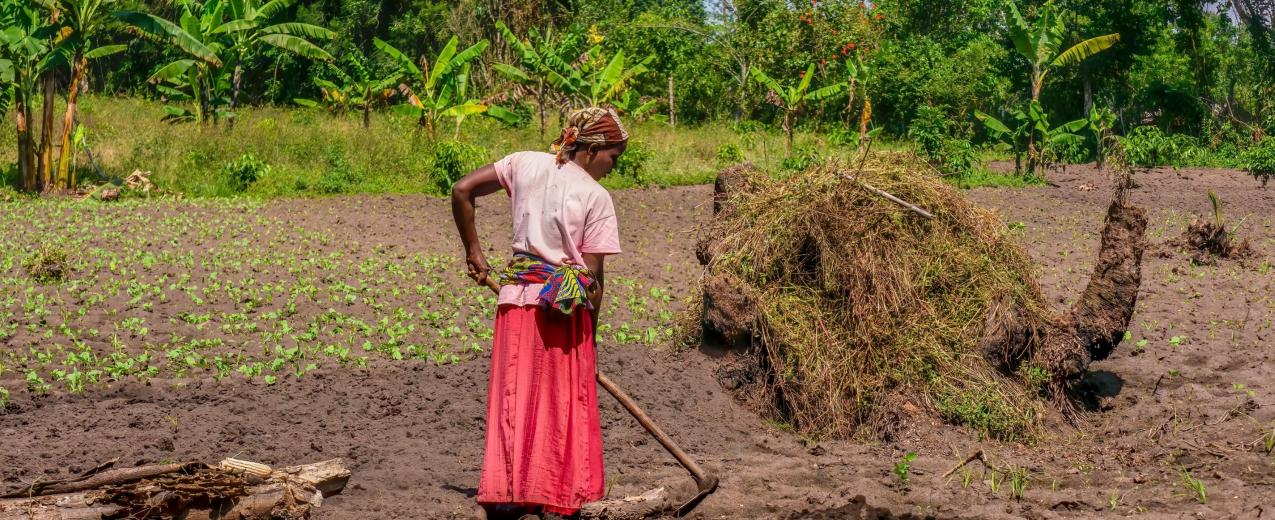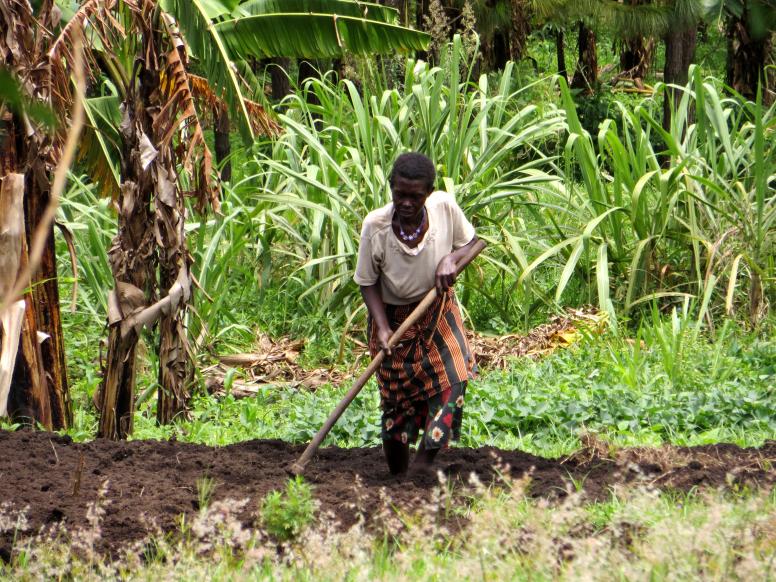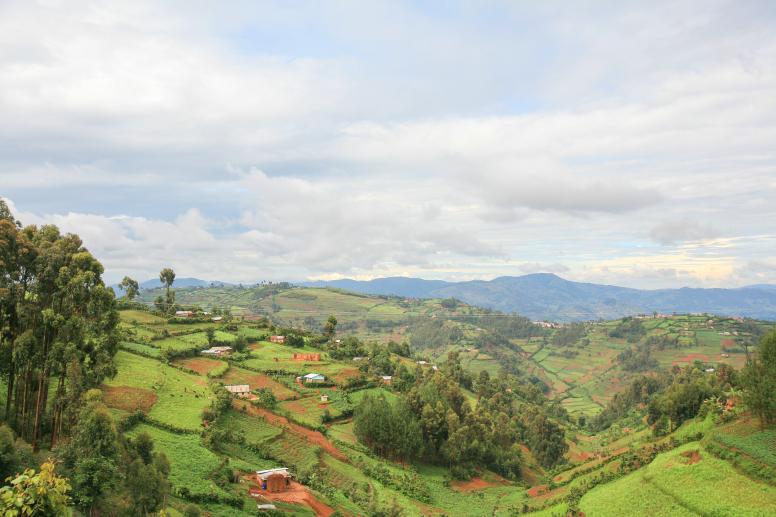
- Blog
- 1 juin 2021
Challenging gender norms in Uganda: How agricultural programmes can inspire women to thrive
- Author: Carmen Leon-Himmelstine
- Published by: ALIGN
Women’s contribution to agriculture tends to be undervalued and, therefore, uncounted. Estimates suggest that, on average, 45% of women in lower middle-income countries are part of the agricultural labour force, compared to 37% for men. Across the African continent, the estimates of the female share of agricultural labour vary enormously, from 56% in Uganda to 24% in Niger. But one thing is clear: young women face particular challenges in terms of agricultural participation and productivity because of their gender and age. Women can rarely afford access to extension service agents (individuals who provide technical advice and information on agriculture), are often excluded from decision-making in their own households and are less likely to inherit land than their male counterparts, as shown by previous ODI research.
In response, an ODI study (supported by the Mastercard Foundation) has explored the challenges and the opportunities that the agricultural sector can offer to young women in Uganda, in the context of the Youth Forward Partnership. Youth Forward targets economically disadvantaged young people, aged 15-24, living in Ghana and Uganda who live on less than $2 a day, are out of school, unemployed or underemployed, and who have reached a transition point in their life such as seeking their first job, marriage, or becoming head of household. In Uganda, the Youth Forward Partnership is implemented by two consortia, YETA and DYNAMIC.
Diverse gender norms shape the experience of young women in agriculture
Our ODI study found that gendered norms – along with stereotypes about the different capabilities of women and men – have a negative impact on the participation of young women in agriculture. Norms about the ownership of land, for example, have major implications for women’s livelihoods, including the use of land as collateral to access finance, as seen elsewhere in Africa. Norms about suitable work for men and women mean that women are treated as ‘helpers’ and are more likely to be involved in the least profitable activities or crops than men. Young women also tend to be responsible for unpaid care and domestic work. While this makes them crucial for the wellbeing of their household, it also places a double burden of work on them, and often diverts or halts the trajectory of their agricultural enterprises.
Initiatives that can close such gender gaps, therefore, have the potential to drive significant gains for young women and improve their position in their households and society, as our study observed.


Young women in agriculture as agents of change
Our study found that a combination of mentorship, formal training (e.g. in financial literacy, life-skills training, agricultural best practices, entrepreneurship, etc.) and the support for the creation of youth groups improved livelihoods, skills, confidence and perceptions of self-worth among young women. Once they had participated in such programmes, they were more likely to perceive agriculture as a livelihood that offered them the chance to thrive and to achieve their life aspirations, rather than an occupation of ‘last resort’, as one participant mentioned:
‘Those of us who are enterprising, we keep encouraging ourselves to save more money, to invest more money, so that we can also be better. Since we have little responsibility at this age, we assume that by the time we get responsibility, we shall have accumulated some money that can help us do some business to earn a living.’
Belonging to or establishing youth-friendly Savings and Loans Associations (VSLAs) allowed young women to save, access credit and borrow money when no other options were available to them. This helped women re-invest their incomes in their own businesses. The young women who took part in our study also said that taking part in such programmes enhanced their aspirations for the future:
‘In five years to come, I see my future and my life building a house made of iron sheets for my family. I see myself taking my children to school and if I continue with the savings that I’m doing right now, I will even see that food is enough for my household … I feel happy about my future ahead.’
Some of the challenges that emerged from the research included the risk of groups dissolving as a result of internal conflict, a lack of links between youth (mainly young women) and agri-input/output companies after the programme, and the potential need for further training. These shortcomings have an impact on the longer-term sustainability of their farming enterprises and highlight the importance of sustained support and monitoring during implementation and beyond the lifespan of any particular programme.


Five ways to challenge gender norms through agricultural programmes
Five key recommendations have emerged from the Youth Forward research to shape future projects that can influence gender norms and improve women’s livelihoods in agriculture.
- Encourage the participation of young women in groups and networks to boost learning and economic activities: Their participation in saving groups or group enterprises allows them to meet other women with similar goals, to motivate each other, to access credit and to benefit from peer learning. These groups need to consider women’s needs such as support for childcare, flexible timing for training and prioritising enterprises that can lead to higher returns for young women according to their skills.
- Introduce a focus on gender norm change in programmes: Sustainable change to the gender norms that undermine young women’s agricultural livelihoods and overall wellbeing is only possible when programmes identify and include strategies to address such norms. For example, programmes need to integrate approaches that encourage men to participate in unpaid care and domestic work or that raise awareness about women’s ability and suitability to make decisions about the use of their own cash. To do this, programmes need to allocate more resources to deliver activities that address gender norms, while also targeting men.
- Identify and work with female role models from the community: Working with female role models and educators (known as mentors in YETA and peer educators in DYNAMIC) is highly effective as they can transmit knowledge and skills, encourage, inspire and demonstrate how much young women can achieve in their own businesses. However, implementers need to make sure that female role models are available and have an incentive to engage in these interventions
- Support long-term change through linkages with government initiatives: Long-term and sustainable change will only happen when young women are aware of other local government programmes that can continue to support them when the international donors’ interventions come to an end. Building collaborations with local governments at different levels, together with government-led action to raise awareness across genders about existing government support, can ensure that young women’s gains are not lost.
- Factor-in soft skills training: In addition to agriculture and business skills, young women in Youth Forward have benefited from sexual, reproductive health and nutrition sessions, and from problem solving and leadership activities. It is crucial to invest in and integrate these skills, so young women can find wider benefits that can be applied within their households and communities, beyond agriculture and business development.
Conclusion
It is vital to celebrate women’s contribution to agriculture. However, donors and policymakers also need to place gender equality at the forefront of global agricultural programming, policies and research. This means more proactive and direct action to address the gender-specific constraints that hold back women’s engagement in the agricultural sector. This, in turn, demands Interventions that not only acknowledge gender needs but that are also transformative and contribute to shifts in social and gender norms. Such interventions are more likely to contribute to structural and sustainable changes that benefit women, their households and wider society.
About the author


Carmen Leon-Himmelstine is a Senior Research Officer at ODI. She holds a PhD in International Development from the University of Sussex and before joining ODI she was based at the Institute of Development Studies. Carmen writes about migration, social protection, gender, health and child poverty. She has extensive field experience in communities in Latin America, the Caribbean, East Africa and South East Asia. Her research has been published in peer-reviewed journal publications, project reports and working papers.
- Tags:
- Economic empowerment, Agriculture
- Countries / Regions:
- Uganda
Blog
5 janvier 2026

Report
20 octobre 2025

Report
6 octobre 2025
